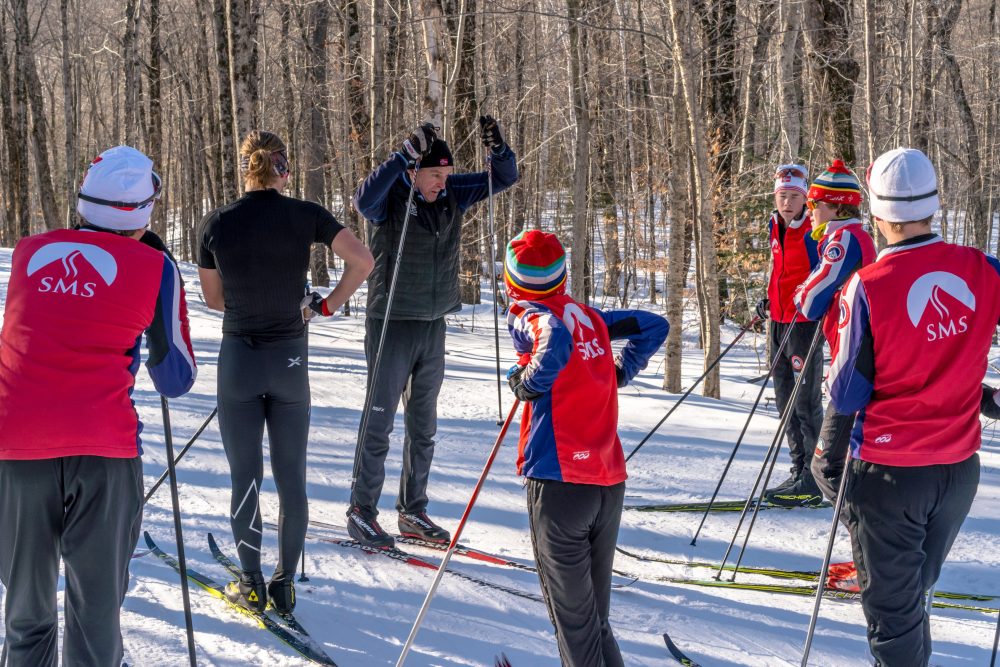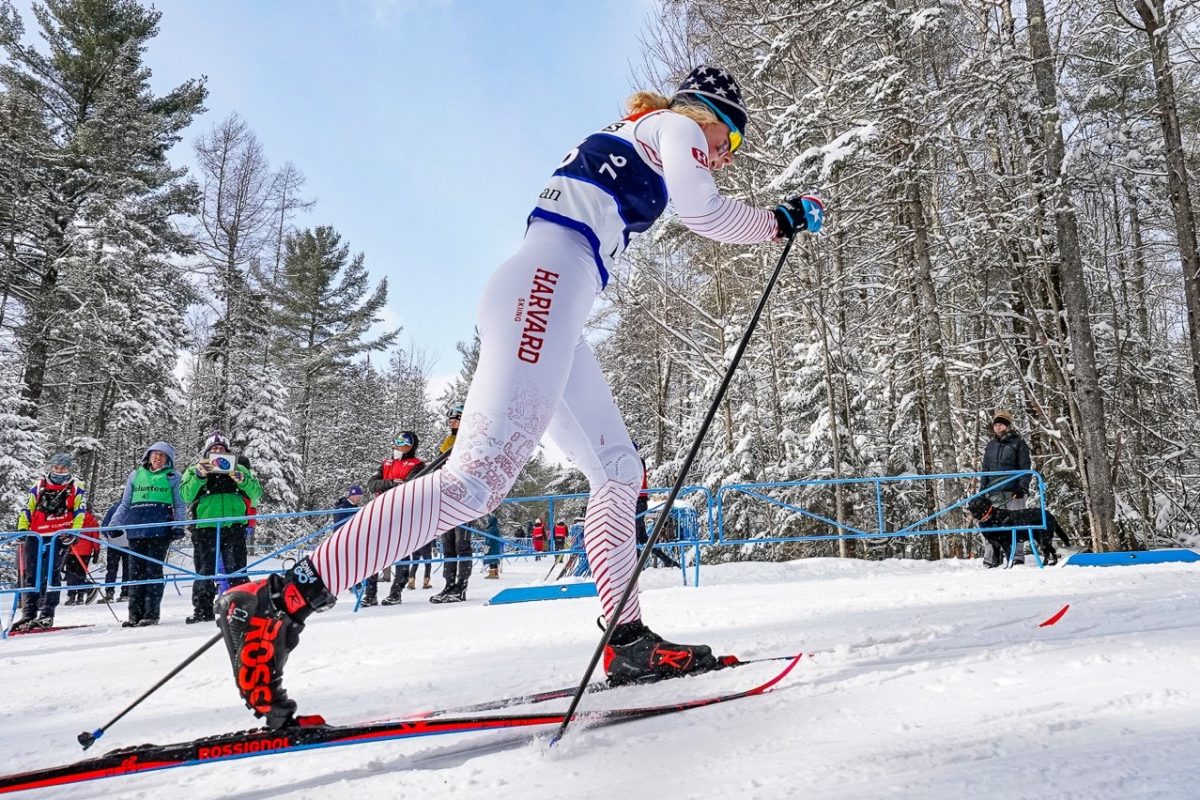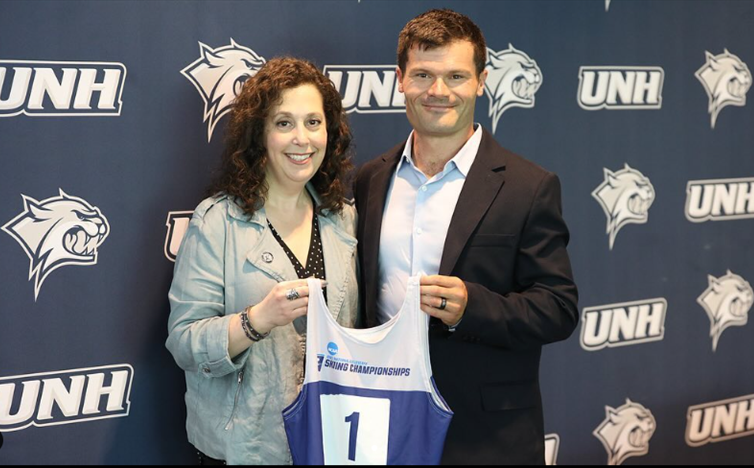
“I am not making them great. They are making themselves great.” – Sverre Caldwell
Long-time Stratton Mountain School (SMS) coach Sverre Caldwell will step down at the end of this school year. According to an article in the Bennington Banner, during Caldwell’s tenure, SMS sent 15 cross-country skiers to the Winter Olympics. SMS also had at least one Junior National champion and one World Junior team member for 24 consecutive years. Caldwell was U.S. Ski & Snowboard’s Coach of the Year in 2001, 2003, and 2009.
Caldwell’s name became synonymous with SMS as the cross-country ski program has evolved over the years. He began his career at SMS in 1980 with a small core of athletes. Along with his coaching duties, Caldwell initially taught Math and took on the role of headmaster for four years beginning in 1992.
In the matter-of-fact tone of someone understanding where their strengths lay, Caldwell deadpanned, “so I was headmaster for four years and did not enjoy that, so I went back to coaching. I have worn a lot of different hats, but mainly ski coach except for those four years as headmaster. So I have been ski coach with occasional teaching, those are the different roles I have played at SMS.”
The academic and outdoor sports focus of SMS calls for two parallel staffs: one dedicated to academic classroom work, the other focused on developing athletes on the alpine slopes, cross-country trails, and halfpipes.
“Because the coaches travel so much in the winter and everyone is on different schedules,” Caldwell said. “You can envision that nordic skiers don’t travel as much. But a lot of the alpine races are midweek because the alpine mountains don’t want to close their trails on the weekends. So it would be hard for me who is off to senior nationals for ten days and off to junior nationals for ten days to be teaching a bunch of alpine kids the little bit of time when they are around.”
Due to those time constraints, Caldwell’s work with younger athletes revolved around his cross-country coaching. Along the way, he also helped establish an elite team. Initially known as the SMS Elite Team, that training and racing group is currently called SMS T2. Current and former SMS T2 athletes include Jessie Diggins, Andy Newell, Simi Hamilton, and Sophie Caldwell.

The following is a conversation between Jason Albert and Caldwell on April 30, during which Caldwell reflected on his career.
FasterSkier: Much has changed in sport since you began in 1980 at Stratton. Can you reflect a bit on what you personally have changed when it comes to your craft?
Sverre Caldwell: What I have done really hasn’t changed that much. Having had your average of 10 to 15 kids a year for almost 40 years, it is always a variation on the theme. But you are training year-round for skiing. So I might go ‘this year we are really going to work on this’ and it turns out to be one workout a week different. Everyone is going to [train] a lot of distance and some intensity and it depends on when or how hard you want to go and when you want to introduce the intensity.
From my perspective, I have always tried to think of myself as a teacher of cross-country skiing. You just kind of help reach the kids as much as you can so that they can learn what makes them click. And it is really important that they take ownership. So I am trying to help them make decisions that are going to help them.
I am not making them great. They are making themselves great and I am going to help them figure out how to do that.
I know it has changed because I used to be young and athletic and lead all the workouts. Now I can’t keep up with anyone so I’m watching. You know the educational piece and teaching them a sport has evolved, but that has not really changed dramatically. When I started coaching here, no one trained year round for skiing. If anyone joined the program, it was pretty much instant success because they were training year-round for skiing and very few other people were doing that. Now, a lot of people are training year-round for skiing. It has gotten more competitive and you look at international results and it shows. It is pretty cool. We have had three different skiers in the last three years get medals at World Juniors. And twenty years ago we were not getting medals at World Juniors. Competition is improving because a lot of people are doing a better job and the clubs are really helping that.
Another piece of that change that I think has also helped the Stratton program is having started an elite club. We have our SMS T2 people training here and the kids can see Jessie and Sophie and Simi and Andy Newell, some of the best skiers in the world. They did what we did. So here is a pathway.
FS: What is one key take away from having your younger athletes in close proximity to SMS T2 skiers?
SC: My goal is always to have people to go into their biggest races expecting to do well because they have confidence. They know ‘when I do this I can ski well.’ So then you do whatever ‘this’ is before your big races. You go in with confidence versus hoping to do well. It really helps when you have that pathway of success and you can see that and you can say ‘oh, ok I can see why we are doing this and I can see why we are not doing a lot of hard intensity here in the spring and summer. Because those guys don’t do it either’. They are just building up patience and keeping a long term approach. The SMS T2 skiers tend to be good athletes and are as efficient as possible and all that sort of stuff that we preach to the younger skiers.
FS: It comes with the territory with an environment like SMS — parents with high expectations and demands when it comes to performance. That’s a dicey road to navigate.
SC: That has definitely evolved. Recently, it has become easier because I am older than all the parents. I remember when I started, parents were these scary people. Back then, I was just very enthusiastic and the team was doing well and everyone was going ‘oh this is great’. At this point, this is a major way that relationship has evolved. When people come in to interview if they are deciding if they want to come here next year, we say, ‘this is the way our program works and this is the way we do it’. And so they’re coming in and they are choosing this program because we have had great success and they are trusting that we know what we are doing. For the most part that has worked very well. That really hasn’t been much of an issue.
FS: In many ways, you are the East Coast sage of junior coaching. Do you field lots of calls from other coaches seeking advice?
SC: I enjoy talking to people and some people do. I can always talk skiing. Since I’m sure they will think, ‘why did I even ask him because he won’t shut up or something?’.
It is fun talking to different people and discussing issues that different programs have and helping them figure out how to do a different angle or something. It is not like I know everything. But I do enjoy talking about stuff and I think that our success has been because we have been really focused on helping each individual athlete, being patient, and looking at the big picture.
FS: One thing you have going on at SMS is resources. SMS life is not cheap. Does that play into the success?
SC: I think a lot of it is resources and a lot of it is education. I feel the educational part is really important. The kids understand why we are having them do different things. Education and ownership. I’ll see people come into our T2 team and it is like ‘Jesus, these guys just think if hard is good, harder is better’. It is like, ‘where in the hell have they been?’ They need to know how it all fits together. So the educational piece I think is very important. I would like to think that we train smarter than most people and I know some people train harder then we do. It is not like we are not training hard, but we don’t want to train too hard and burn out in February for example.
FS: I forgot to ask, how old are you?
SC: I am 64 years old.
FS: I consider that to be pretty young.
SC: Nobody in my family says that.
FS: Have you been thinking of retiring for a while?
SC: I actually decided, probably two or three years ago. And it was a combination of a bunch of things. One is, (laughter), I was inspired by Big Poppy… that’s my baseball reference. I thought it was pretty cool that when he went out, people were kind of going ‘why don’t you stay?’ I didn’t want to be here so long that people were going, ‘I cannot wait for him to leave.’ That was a piece of it.
I had a winter term sabbatical three years ago and Lily, my wife, and I traveled in Europe for something like 10 to 12 weeks and that was really fun. And so part of the plan was to be able to travel a little more and spend time with my wife. I still love coaching, but I am getting tired of all the administrative parts. I just want if I can spend more time with my wife and travel a little more and just back off that is going to be awesome and I believe you only go around once and so I didn’t want to … I don’t want to turn into this guy who is working for pay instead of working for passion. I wanted to leave on a good note. Leave on top. (Laughter.
A combination of all that. With Lily getting cancer, it was this is a good decision and I need to spend time with her and hopefully do stuff like that.
FS: Do you plan to stay involved with the school in some capacity?
SC: I will. I am definitely planning on helping with SMS T2 the same way I have the last whatever many years the SMS T2 team has been in existence. It is hard when you get old, you start to forget. That is another reason I am retiring.
While I have been coaching at Stratton, I have been administering the T2 team so the coaches can coach and don’t have to be out running around raising money and finding housing and stuff like that. I am going to continue in that role, making sure that Patrick [O’brien] doesn’t have to do too much of that grunt work and I can make sure the program is viable and we can run and keep thinking about what we need to do to be better.
That is the part that was not paid for through the school, but it was obviously a benefit to the school. So I am going to keep doing that. I have not talked to the school about what my role is with them. Matt Boobar will be taking over my job which is great and he has been here for ten years. We have been sharing an office and we can complete each other’s sentences. And so that is going to be a very smooth transition. I will be around. I will be available. At this point, I don’t have any job or contracted affiliation. I will be there, to chat with them and help however needed. But he needs to be able to run the program himself without me sitting here. I need to give him the distance. I will help however I can. What I foresee, if I am doing more coaching it will be going out more with the T2 team and talking to Pat more about what I am seeing. But, once again, without trying to tread on him.
It is always a tricky balance when you have been around and someone thinks they know a lot so they come in and dictate. It has to be this thing like where am I going to be useful and going to be helpful.
I still love working with kids. I am ready not to do it full time.
Peter Minde
Peter Minde is a FasterSkier contributor and personal trainer specializing in functional strength and corrective exercise. Whether skiing, trail running, or cycling, he’s always looking to see what’s at the top of the next hill. From the wilds of north N.J., he skis for Peru Nordic. On Twitter @PeteMinde or at www.oxygenfedsport.com.



